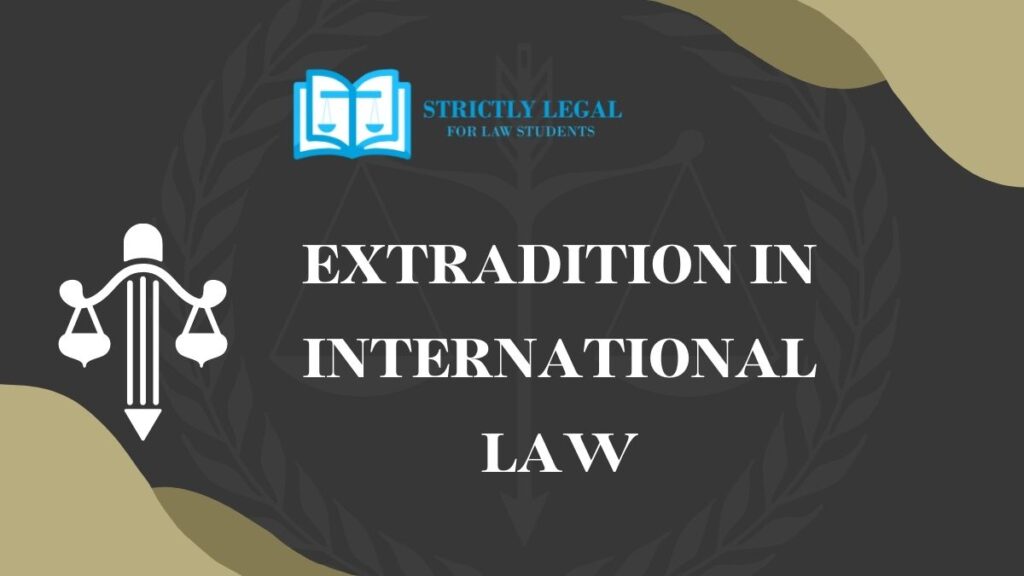The Indian Penal Code shields the country against crimes by providing separate several statutes for the same. However, what if someone commits or allegedly commits a crime in the country I.e., India and flees? Or what if simply the accused or the soon-to-be accused just escapes from the country to not withstand a conviction? In such cases, the country from where such a person fled away requests the country to where he fled to send him back to the former country on account of a free and fair trial. The procedure of returning the accused/ soon to be accused/ or the convict to the nation from where he fled away is known as extradition.
Table of Contents
Understanding the term “Extradition”
The term “Extradition” is however derived from two Latin words. Ex means out and Tradium mans giving up, based on the Latin Maxim aut dedere aut judicare which indicates that either extradite or prosecute.
However, while making extradition happen, there shall be two parties to it, I.e., the requesting state and the terrestrial state. The requesting state is the one where the offence is committed or allegedly committed, and the terrestrial state is the one where the accused or the convict escapes to protect himself from getting convicted.
The notion behind extradition
The idea of extradition is focused on the submission that an accused or a convict can be tried or punished with the greatest potency at the place where the cause of action induced or the crime/ alleged crime took place. This idea was taken into consideration because it is quite obvious that it is more favorable to sue/ prosecute the accused where he committed/ allegedly committed the crime, let’s say, for instance, the obtaining the relevant document or evidence is easy and more convenient in the same country where the offence was committed. In addition to that, the term state sovereignty pops in while talking about extradition. State sovereignty refers to the ultimate authority of the concerned state over its citizens and territorial jurisdiction.
However, in order to make successful extradition happen, both the territorial state as well as the requesting state should show mutual interest in the due maintenance of the law and order and the administration of the justice require that the nation should cooperate with each other in terms of returning the accused or convict to the requesting state. To avoid any sort of clash or war between the state sovereignty and administration of justice, most of the nations enter into certain treaties that govern extradition. Various countries have their kind of statutes and penal codes which deals with extradition treaties, like India has the Indian Penal Code, 1860. However, IPC does not expressly mention about extradition treaty but implicitly expresses the same via relevant jurisdiction. The Extradition Act, 1962, however, gives a detailed knowledge, provision and statute for the extradition treaty of India.
Purpose for Extradition in International Law
An accused or a convict is extradited from the territorial state for reasons that are mentioned below:
To prevent escaping from the conviction:
Most runaway convicts or the accused run from the competent jurisdiction to any other countries, known as the territorial countries in a hope to escape their conviction back in their native or requesting country for the offence they are accused or allegedly accused of. Such an inexcusable motivated accused or convict must be extradited so that it sets an example to other netizens as well the convict or accused does not roam around freely after having committed the offence.
As a discouragement
Extradition has an absolute damper effect on the criminals or alleged criminals as every successful extradition does act like what is called a red flag to the criminals who are planning to flee the country of the legally competent jurisdiction.
To maintain peace in the territorial state
If by mutual interests and to protect the legal interests of the respective countries, the accused or the convict is not extradited, it will only be another way for the criminals to gain confidence who plans to flee the country of the legally competent jurisdiction for their conviction. If the territorial state refrains from extraditing the accused or the convict to its requested state, it would only help keep their and other such criminals’ motivation to flee the country in the near future, ultimately ruining the peace and harmony of the territorial state.
Extradition Under Indian Laws
The Extradition Act, of 1962 calls for the extradition of escapee criminals both to and from India. The extradition may take place in compliance with any extradition treaty with the requesting or territorial state. Nonetheless, the Act gives no such restrictions for the extradition of Indian Nationals to the requesting state. As of now, India has an extradition treaty with 48 countries across the globe.
In Dr Vijay Mallya v. State Bank of India, the petitioner who is the owner of Kingfisher Airlines owed a screeching amount of INR 6000 crores to seventeen different Indian Banks including the State Bank of India and Indian Overseas Bank. However, Vijay Mallya fled the country to the United Kingdom, fearing his conviction in 2016. However, he still could not be bought back to India for not fulfilling certain extradition restrictions of the United Kingdom.
In Nirav Modi’s case, the Punjab National Bank filed a complaint to the Central Bureau of Investigation that Nirav Modi along with his wife is fraudulently acquiring fake Letters of Understanding (LoU) which is worth INR 11,400 crore which were channelized to his fifteen foreign companies. Following the CBI probe, the ED impounded Nirav’s assets in India. He also fled from India to the United Kingdom to seek asylum. Following an extradition request from India, a Westminster Court issued an arrest warrant against Nirav. The Court ordered his extradition to India in 2021.
Conclusion
The concept of Extradition is a key tool to render justice as well as to maintain a smooth and safe connections with the countries across the globe. However, it is still believed that India has not maintained extradition treaties with all the countries of the world which is a huge loophole in the Criminal Justice System. This lacuna may not only help the criminals/ accused/ convict flee the country but may also show ways to gain terrorists or security threats to the country.

Law student.
Turning legal insights into engaging narratives.





